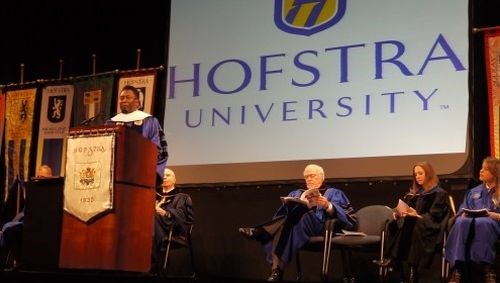Calls for more reforms in FIFA
‘The Soccer as the Beautiful Game’ conference between April 10 and 12 at Hofstra University on Long Island was attended by more than 100 academics from 25 countries.
This was the largest ever group of academics and journalists at a football-related conference in the US, which most at Hofstra felt reflected the growing standing of the game there. Amongst the high profile attendees was Brazilian legend Pele, who ended his playing career in the country.
The first of two key note speakers was Dr. David Goldblatt, the English academic and author of The Ball Is Round history of global football.
“Football has acquired the most incredible global social standing. Political elites are willing to engage in the game,” said Dr. Goldblatt, who, argued for a “popular model of sovereignty”.
Dr. Goldblatt added: “There is a strong argument for a democratic model of sovereignty in football. The idea that football must be run by football people is a ridiculous, transparent and self-serving argument. But for most of the football industry, possession is nine tenths of the law. There are very few ways into FIFA.”
He called for greater external representation to achieve this popular model of sovereignty, which could be achieved by introducing players on all international governing bodies. He also advocated a discussion over the introduction of term limits and greater female representation on boards was also essential at every level.
Ongoing debate on reforms
With a presidential election due at FIFA next year, Dr. Goldblatt contributed to the ongoing debate on how to reform the world body by identifying five key areas that needed to be addressed. In addition to governance, he suggested that match-fixing, the relationship between football, commercialisation and capital, what he described as spectacularisation and mega-events all needed to be addressed.
Dr. Goldblatt, who spoke at the 2009 Play the Game conference in Coventry and now works at Pitzer College in California, added: “FIFA has a lot of power over the confederations and national associations. At the very least, stealing has to stop [at national associations]. It’s not corruption, it’s stealing; where I come from we call it theft.”
On transparency, Dr. Goldblatt cited a FIFA executive committee member, who said he had not received a single briefing document prior to meetings in the last two years. “Transparency has to improve,” he added. “The documentation is not there. As a model of transparency, it sucks.”
Dr. Goldblatt also told the conference that that the professional game’s relationship with the grass roots was not good enough, adding: “We need to find new mechanisms to channel the extraordinary amount of money coming into football.”
To illustrate the problem of spectacularisation, Doctor Goldblatt cited the growing influence of television companies over the game. He described the playing of the track ‘Hell’s Bells’ by Australian heavy rock group AC/DC at the 2013 Confederations Cup in Brazil as “simply not an appropriate way to celebrate Brazilian football culture. It’s beyond a joke.”
He also insisted that FIFA needed to employ more rather than less staff to address the issue of legacy at mega-events, notably World Cups, before they are even awarded.
“FIFA need to employ urbanists and geographers to consider the consequences of their decisions,” said Dr. Goldblatt, who was critical of the method of awarding World Cups that was dominated by a handful of men but keen not to personalise the need for reform in an attack on FIFA president Sepp Blatter.
Neglecting women’s football
The other key note speaker, Dr. Jennifer Doyle from the University of California, was also critical of governing bodies and suggested that women’s football had been so badly neglected that a separate body was needed.
In an intellectually stimulating but sometimes esoteric address, Doyle cited her own experiences with the Indian women’s’ team as an example. She told the conference: “FIFA and the IOC [International Olympic Committee] have a stranglehold. These events become more inevitable with each generation.
“Most of the countries with women’s national team programmes would, I think, fare better if they were organised independently.”
A reserved Pele
The guest of honour at Hofstra was Pele. The revived New York Cosmos – the soccer team where Pele played during the 1970s – are playing again at Hofstra and the three-time World Cup winner was awarded an honorary degree by the university on April 11.
In two addresses, Pele focused more on his experiences in the US rather than the ongoing debate for change at FIFA and would not speak to the media. However, earlier this year Pele came out in support of Jerome Champagne as an independent candidate for the FIFA presidency.
Some of the ideas put forward by Dr. Goldblatt, notably the need for greater democracy, have been advocated by Jerome Champagne and this seems likely to remain a key area ahead of the presidential election.
The conference website can be found here.






